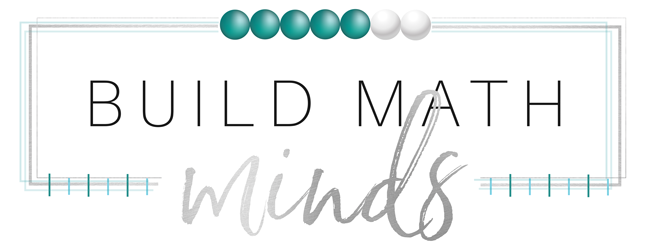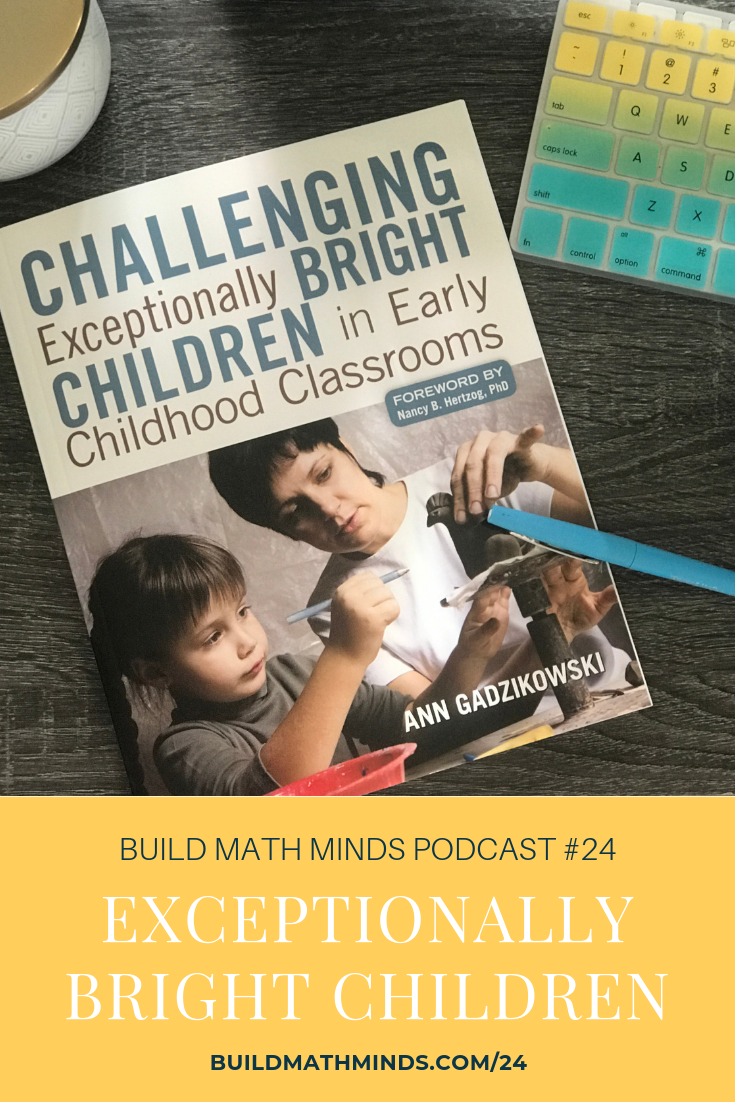Resources mentioned in this episode:
Challenging Exceptionally Bright Children in Early Childhood Classrooms by Ann Gadzikowski
Welcome fellow Recovering Traditionalists to Episode 24. Today we are discussing Exceptionally Bright Children.
Ok, so I’m just going to say this upfront that this episode may go a bit longer than my normal book insight episodes and I’m going to try not to cry while doing this. I’m going to tell a personal story before I get into the book I want to talk about because I bet you probably have a child like my son in your classroom.
I have 4 kids and one of my boys really hates school. It started in Kindergarten. About ¾ of the way through his first year of school it became very difficult to get him up in the morning to go to school. There were lots of tears. Now he’s also a very young kindergartener. His birthday is in July so he was just barely 5 when he started school. I was starting to rethink our decision to NOT hold him back and wait to start kindergarten. But I knew he was academically ready to be in kindergarten.
I try to be realistic about my kids’ abilities and I wouldn’t say any of them are gifted, but they are smart kids. I knew he was more ready academically than a lot of the kids going into kindergarten and I didn’t want him out another year.
So back to his kindergarten year….one morning he told me “School just isn’t a place for me!”
I asked him who told him that and he said no one did, it was just something he knew. I dug deeper and had as much of a conversation as you can with a 5 year old and realized it was just something he felt. School wasn’t a place he felt he fit into.
We live in a very small and rural town that has one elementary school, so there are no options for charter schools or Montessori schools or anything like that. Both him and I felt stuck.
We got through the year and his 1st grade year was better. But last year, in 2nd grade it became an issue again.
Now I had my thoughts about why he was struggling being in school and he confirmed them saying that it’s boring. My belief was that he already knew the information and thought it was meaningless to do stuff he already knew how to do.
We went through a time of him not doing his work in school and us taking away all electronics at home. Even through he would bring his work home and could finish it within 5 minutes. And this just confirmed my belief that school wasn’t challenging him. But I’m also of the mindset that you just bear through it and get your work done. That’s what both my husband and I remember doing when we were kids. If the teacher gives you something boring and what you might perceive as “dumb,” well you just shut up and do it because that’s what you need to do.
So, I had this struggle going internally that I want my child to be respectful and do the work that the teacher gives, but I also want the teacher to challenge my child at a level he is at, while also realizing that the teacher has 25 kids in the class that all have different needs. So never once did I put any blame on the teacher, and I still don’t because I know teaching is hard and I really didn’t have any good ideas for her.
I felt like if I was going to go complain to her that she needs to do something to help my child then I needed to give some suggestions and I just didn’t have any….plus his teacher was pregnant and had a long-term sub for part of the year so there was that extra layer as well last year.
Okay so why am I telling you this??? Well, I was cleaning out and reorganizing my bookshelf and came across a book I haven’t read yet. I opened it up just to skim through it to see if it was something I should read and the page I opened up to made me start crying. I believe that things are brought into your world at the time you need them and this book is one of those.
The book is Challenging Exceptionally Bright Children in Early Childhood Classrooms by Ann Gadzikowski.
Now as I said earlier I’ve never thought my children were gifted so I wasn’t really reading this for any of my children. However, after reading this one page that I opened to I now realize that my son is an Exceptionally Bright child. He isn’t the type of child that will be seen as Gifted and given the opportunity to go into the Gifted special times, but he is exceptionally bright and the regular classroom activities don’t challenge him and thus he acts out.
So this podcast is for you, Camden, and all the other kids out there like you.
On pages 8 and 9, Ann gives ways to recognize an Exceptionally Bright child. I’m going to skip through it to give you an overview of the characteristics so that you can spot them in your classroom:
“…spotting the behaviors of exceptionally bright young children is not always so easy. In a typical early childhood classroom, where children do not yet participate in traditional academic activities such as writing reports, taking notes, solving equations, or taking tests, it may be hard to see that some children are demonstrating advanced cognitive skills and abilities. Also sometimes these skills and abilities are difficult to recognize in children because those who are bored and needing a challenge may misbehave or use materials inappropriately….Of course, not all exceptionally bright children misbehave when they are bored. Some are able to find appropriate outlets for their energy and curiosity and others simply withdraw.
There are a few specific behaviors and characteristics, however, that seem to be common among many exceptionally bright children. One is a long attention span, at least for the activities and topics that they are passionate about….It is important to keep in mind that for exceptionally bright children a long attention span is often born out of a passionate interest and insatiable curiosity, not the desire for friendship or to please a teacher and follow the rules….
Another indicator that a child is exceptionally bright is a very good memory. An exceptionally bright child may be one who remembers, after a class baking project, the exact quantities of flour, cornmeal, sugar, and baking powder used to make the cornbread…An exceptionally bright child may remember words he has heard only once and use a very large and varied vocabulary in casual conversation….
Exceptionally bright children often demonstrate their cognitive abilities in the ways they make connections between ideas and things that are not, for most children, obviously connected…
Children who are exceptionally bright sometimes struggle to make friends and respond appropriately to their peers. But occasionally the child’s social interactions are the arena where a child’s abstract thinking is best demonstrated. A child who is strongly empathic and understanding of other children’s emotions, who displays unusually mature gestures of kindness to others, may do this because she is able to think abstractly, symbolically walking in someone else’s shoes.”
After reading that I know that I need to read the rest of this book because this is Camden to a “T.” There are so many times that my husband and I will look at each other and say things like “How does he know that?” “Where did he learn that word?” and so on. He hears things once and he’s got it. He acts out when he is bored and makes you think he doesn’t care but he is also the child who is extremely kind and would do anything for you.
I tell you this story about Camden and this part of the book because I’m wondering, do you have a child in your classroom who is demonstrating these qualities? Then I want you to get this book. But just a reminder that I haven’t read it. I’m currently in the process because I want to have suggestions for this year’s teacher on how to help him.
To give you a little bit of insight, the suggestions in the book are based on what Ann calls The Braided Thread: Differentiation, Conversation, and Connection.
So, like always, I can’t do these books justice in a podcast. I encourage you to go straight to the source and read the book for yourself. We have a lot out there on how to help our struggling learners but if you need some guidance on how to help your students who are more advanced then please go get this book. Head over to buildmathminds.com/24 for the link to the book to help you with kids like my Camden.
And thank you for the work you do out there to help all your students. You have such a varied classroom of students and I know it’s difficult to meet the needs of all of them. So I hope through this podcast and the books and articles I recommend it gives you some insights to help the varied abilities of all the students in your classroom.
Subscribe and Review in iTunes
Hey, are you subscribed to the Build Math Minds Podcast, yet? If you’re not, make sure to do that today because I don’t want you to miss any episodes! Click here to subscribe to the podcast in iTunes.
While you’re there, don’t forget to leave a review on iTunes too. I would love to know your thoughts and how we can make sure that we give you content that you will really enjoy.
To leave a review, head over to iTunes and click on “Ratings and Reviews” and “Write a Review.” I can’t wait to hear your thoughts about the podcast.





I wish that I had had access to your podcasts and other online materials like the symposium when I was teaching primary aged students. My first year teaching grade three, I had a bright student whose mother was really frustrated that he wasn’t being challenged enough. I was also frustrated because I was just treading water learning a new grade (teaching every subject but music) and I didn’t feel I had the time or energy to meet her son’s needs adequately.
If I had had access to materials and mentorship like Build Math Minds, I hope that I could have done a better job.
I know that with the changes in attitude and learning that I have undergone in my now 40 year teaching career, I would do more for this and all my other bright and gifted students.
Thank you for this podcast. As an instructional coach for gifted and talented, you did a great job sharing the story of your son and informing about the characteristics of exceptionally bright students. This book has been on my “to read” list for awhile, but I think I’m going to put it closer to the top. Thank you Christina!
My heart broke when I heard the story of your son. My son (now 31 years old) was also exceptionally bright. I think he did not have the same issues as your son partly because I homeschooled for kindergarten. We also provided a massive amount of time for free play after school in first grade which gave him time to explore his interests. He was fortunate to have a second-grade teacher who met his needs. He was allowed to make presentations to older grade students about some of his projects. Just like Terese, I feel like this book is one that needs to go the top of my list.
Thank you for continuing to provide thoughtful commentary. Even though I am a middle school teacher, I also gain some insights that I can use with my older students!
I have an exceptionally bright child and also a gifted child…and my “easy” average child! However, I seem to get at least 1 challenging student each year. The student who just makes you scratch your head and wonder if you’re missing something. We often think the kiddo must be something (on the spectrum, gifted, naughty, ADHD, etc), but I draw from my experience as a mom of the exceptionally bright/gifted and see that more often than not. I will buy the book referenced in this podcast to read this summer!